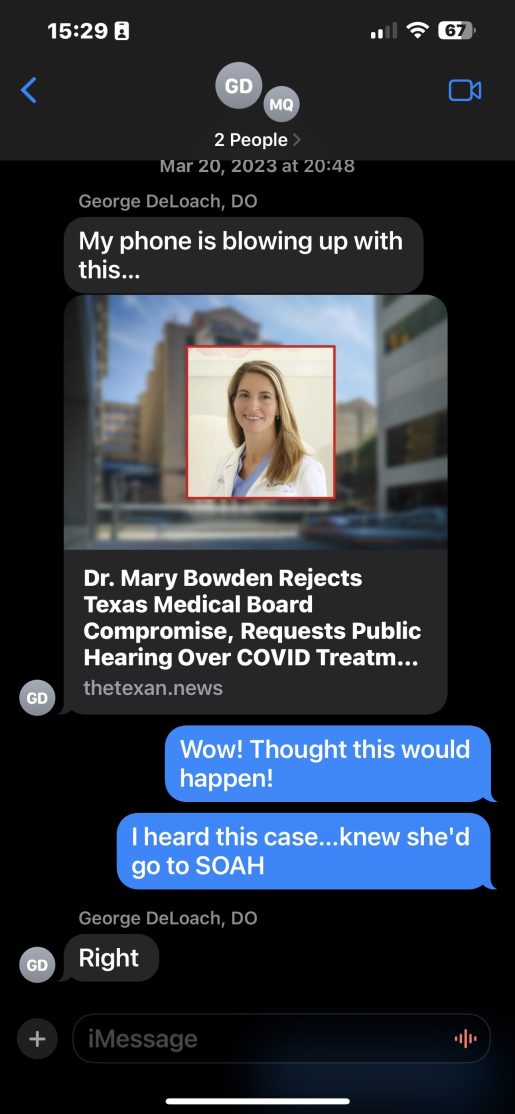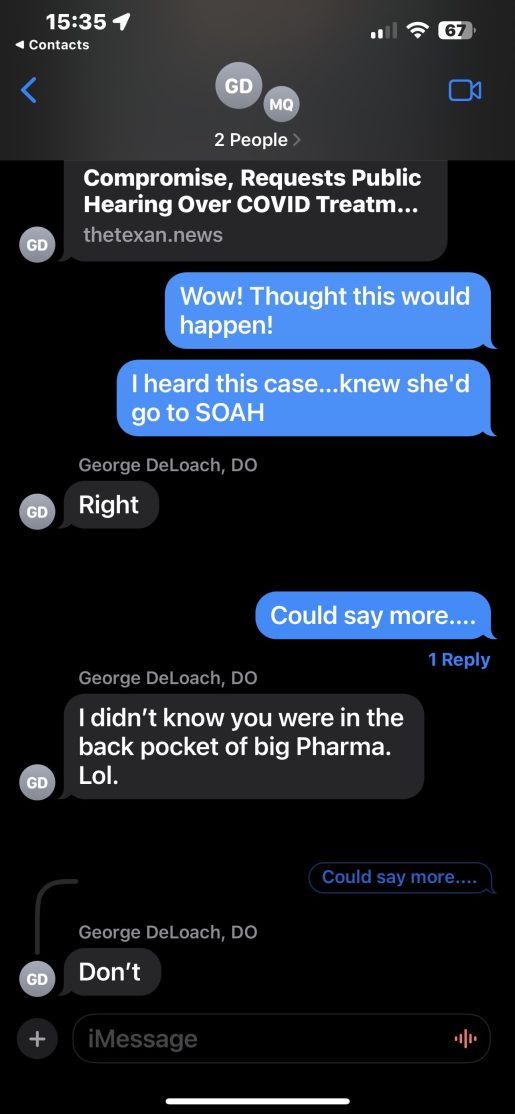Documents obtained by The Dallas Express reveal potentially compromising bias among the Texas Medical Board members who first heard Houston ENT Mary Talley Bowden’s case.
Sharon Barnes, a member of the Texas Medical Board, had been watching Bowden’s rise as an anti-COVID mandate figure and her fallout with Houston Methodist where she had admissions privileges.
On November 17, 2021, just days after Houston Methodist suspended Bowden’s privileges for publicly criticizing vaccine mandates, prompting her severance of all connection with the hospital, Barnes emailed press officer Jarrett Schneider and the entire Texas Medical Board a Houston Chronicle article about the affair.
However, the board did not pursue a formal complaint until 2023, and although the complaint cited Bowden’s conflict with Methodist, the gravamen concerned another dispute with Huguley Hospital wherein Bowden had been thwarted in her attempt to treat a gravely ill sheriff’s deputy with Ivermectin. Therefore, it is unclear why Barnes was interested in this issue at this time.
DX asked Barnes why she was sending these news stories to colleagues; however, she did not respond by publication.
Nevertheless, in 2023, after Barnes sat on the committee that first heard Bowden’s case, she appeared ready to share her views of the doctor, until she was stifled in a text message by a fellow board member.
The exchange started with her colleague, George DeLoach, sharing a story about Bowden. This time it was an article published by The Texan titled, “Dr. Mary Bowden Rejects Texas Medical Board Compromise, Requests Public Hearing Over COVID Treatments.”
DeLoach texted, “My phone is blowing up with this … [ellipses in original].”
“Wow! Thought this would happen,” Barnes replied. “I heard this case … [ellipses in original] knew she’d go to SOAH [State Office of Administrative Hearings].”
“Right,” DeLoach said.


Then DeLoach appeared to sense that Barnes was about to say something she should not.
“Could say more … [ellipses in original],” Barnes texted
“Don’t,” DeLoach responded.
In a text that appeared to come simultaneously with the other messages, DeLoach wrote, “I did not know you were in the pocket of big pharma.” It is not clear what he was referring to.
The other party to the text exchange was Manny Quinones. However, no responses from Quinones were present in the texts DX obtained.
DX contacted Barnes, DeLoach, and Quinones to ask about the meaning of the exchange, but they did not respond to the news outlet’s request for comment.
DX also reached out to Bowden for her take on the exchange.
“Doctors have to be very careful about sharing patient information. One would think the same standards would apply to medical board members during an active investigation,” she said.
“The texts show them essentially gossiping about me. It’s unprofessional and discouraging,” she added. “Additionally, Sharon Barnes — one of the board members who presided over my informal settlement conference — was keen to share my story by email to everyone on the medical board prior to me even receiving an official complaint.”
“If a potential juror did that, he or she would be disqualified from serving. Based on her email, it’s hard to believe Ms. Barnes and the recipients of her email were neutral when they heard my case,” Bowden concluded.
However, this could have hardly come as a shock to the River Oaks ENT. She had filed her own open records requests and made similar discoveries.
In one email she obtained from November 15, 2021, Schneider emailed himself the entire text of the same Houston Chronicle story Barnes had sent, as well as the entire text of a Dallas Morning News story about her attempt to prescribe Ivermectin at Huguley, and another unrelated lockdown-era story.
The reason Schneider might have done this is unclear, and he did not respond to a request for comment.
Then, in the days leading up to the board filing a complaint against Bowden, after Barnes and Quinones had heard Bowden’s case, Executive Director Brint Carleton emailed Board President Dr. Sherif Zaafran, counsel Scott Freshour, and Director of Communications Taurie Sloan a clipping of a story by The Texas Tribune.
The clipping reads:
“Texas Medical Board Attacks Doctor Over Ivermectin”
At the request of two Texas hospitals, the Texas Medical Board is threatening to revoke the medical license of Houston physician Mary Talley Bowden. As Soli Rice reports, at issue is Dr. Bowden’s decision to use Ivermectin to combat COVID-19 and a declaration to only treat patients who had not received a COVID-19 shot.
Having treated more than 5,000 patients with COVID-19, neither of the complaints accuse Bowden of harming a single patient. In fact, one hospital – Fort Worth-based Texas Health Huguley – is upset that the course she recommended for a dying law enforcement officer proved successful.
According to Bowden, the Texas Medical Board offered her a settlement: admit guilt, pay a $5,000 fine, take eight hours of Continuing Medical Education and a jurisprudence exam.
‘I will not plead guilty to crimes I didn’t commit.’ – Dr. Mary Talley Bowden.”
Carlton responded, “It is actually pretty amazing that none of that is true.”
The power each of these figures, especially Barnes and Quinones, hold at critical junctures like the informal settlement conference is hard to understate.
As Bowden explained, cases begin with a complaint heard by a field investigator. If the investigator believes the case has at least some merit, an informal settlement hearing is assembled with several board members presiding. In Bowden’s case, only Barnes and Quinones, who were accompanied by a lawyer, were at the hearing.
“If the case moves forward, then the medical board calls for an informal settlement conference. This is a confidential meeting — the video and transcription are not accessible by FOIA — between the doctor and select members of the medical board. There is no judge,” Bowden said.
“The TMB had their lawyer there and I had a lawyer… but not all doctors bring a lawyer. The board members ask a bunch of questions and then convene and decide to either dismiss or give a punishment,” she explained.
“For me, they decided I needed to pay $5000, take 8 hours of CME and retake the jurisprudence. I could have accepted that and moved on or refused. By refusing, the case now goes to the SOAH, which has a judge. (In my case there are two judges for some reason). The judge, however, is hired and paid by the state, not elected,” Bowden said.
In a previous interview with DX, Bowden said she had rejected the settlement because it was more harsh than those she had seen given to colleagues accused of far more heinous offenses.


